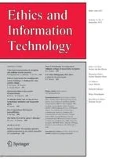Abstract
In this critical response to Charles Ess’ ‚Ethical Pluralism and Global Information Ethics’ presented in this Special Issue of Ethics and Information Technology, it is firstly argued that his account of pros hen pluralism can be more accurately reformulated as a three layered doctrine by separating one acceptance of diversity at a cultural level and another at an ethical theoretic level. Following this clarificatory section, the next section considers Ess’ political and sociological reasons for the necessity and desirability of pros hen pluralism, criticising the former reasons as social scientifically problematic, while elaborating on the latter as more persuasive. In the last section, I discuss how pros hen pluralism may be realised, making three arguments in particular. First, Ess’ requirement for sensitivity to cultural diversity is to be interpreted as differentiated and extended sensitivity. Second, his discussion of shared responses to central ethical problems is ambiguous and needs further elaboration and clarification. Third, his focus on dialogue and Socratic education is persuasive, although excessive optimism is not reasonable.
Similar content being viewed by others
Abbreviations
- CMC:
-
computer-mediated communication
- HCI:
-
human-computer interaction
- ICTs:
-
information and communication technologies
References
Eliot T.S. (1962) Notes Towards the Definition of Culture, 2nd ed. Faber and Faber, London
Ess C. (1996) The Political Computer: Democracy, CMC, and Habermas. In: Ess C., (eds), Philosophical Perspectives on Computer-Mediated Communication. State University of New York Press, Albany, pp. 197–230
C. Ess. Cosmopolitan Ideal or Cybercentrism? A Critical Examination of the Underlying Assumptions of “the Electronic Global Village”. American Philosophical Association Newsletter on Computers and Philosophy, 97: 2, 1998. http://www.apa.udel.edu/apa/archive/newsletters/v97n2/computers/ess.asp
Ess C. (2001). Introduction: What’s Culture Got to Do with It? Cultural Collisions in the Electronic Global Village, Creative Interferences, and the Rise of Culturally-Mediated Computing. In: Ess C., Sudweeks F., (eds), Culture, Technology, Communication: Towards an Intercultural Global Village. State University of New York Press, Albany, pp. 1–50
Ess C. (2002a). Computer-Mediated Colonization, the Renaissance, and Educational Imperatives for an Intercultural Global Village. Ethics and Information Technology 4(1): 11–22
Ess C. (2002b) Cultures in Collision: Philosophical Lessons from Computer-Mediated Communication. In: Moor J.H., Bynum T.W. (eds), CyberPhilosophy: The Intersection of Philosophy and Computing. Blackwell Publishers, Oxford, pp. 219–242
Ess C. (2002c). Introduction. Ethics and Information Technology 4(3): 177–88
Ess C. (2004a). The Cathedral or the Bazaar? The AoIR Document on Internet Research Ethics as an Exercise in Open Source Ethics. In: Consalvo M., et al (eds), Internet Research Annual: Selected Papers from the Association of Internet Researchers Conference 2001–2002, Volume 1. Peter Lang, New York, pp. 95–103
Ess C. (2004b). Computer-Mediated Communication and Human–Computer Interaction. In: Floridi L. (ed), The Blackwell Guide to the Philosophy of Computing and Information. Blackwell Publishing, Oxford, pp. 76–91
Ess C. (2005a). “Lost in Translation”? Intercultural Diaglogues on Privacy and Information Ethics (Introduction to Special Issue on Privacy and Date Privacy Protection in Asia). Ethics and Information Technology 7(1): 1–6
Ess C. (2005b) Moral Imperatives for Life in an Intercultural Global Village. In: Cavalier R.J. (eds), The Impact of the Internet on Our Moral Lives. State University of New York Press, Albany, pp. 161–193
Freeman M. (2002). Human Rights: An Interdisciplinary Approach. Polity Press, Cambridge
Gewirth A. (1994). Is Cultural Pluralism Relevant to Moral Knowledge? In: Paul E.F., Miller F.D. Jr., Paul J. (eds), Cultural Pluralism and Moral Knowledge. Cambridge University Press, Cambridge, pp. 22–43
Hongladarom S. (2001). Global Culture, Local Cultures, and the Internet: The Thai Example. In: Ess C., Sudweeks F. (eds), Culture, Technology, Communication: Towards an Intercultural Global Village. State University of New York Press, Albany, pp. 307–324
Johnson D.G. (2004) Computer Ethics. In: Floridi L., (eds), The Blackwell Guide to the Philosophy of Computing and Information. Blackwell Publishing, Oxford, pp. 65–75
Sartre J.-P. (1947). Huis clos suivi de Les mouches. Gallimard, Paris
Wheeler D. (2001). New Technologies, Old Cultures: A Look at Women, Gender, and the Internet in Kuwait. In: Ess C., Sudweeks F. (eds), Culture, Technology, Communication: Towards an Intercultural Global Village. State University of New York Press, Albany, pp. 187–212
Acknowledgements
For careful comments and valuable suggestions at various stages of development of this article, I am happily indebted to Charles Ess and Luciano Floridi. I am also grateful to Temma Choji, Chikako Endo Elizabeth Frazer, and Faik Kurtulmus for helpful comments and conversations on earlier drafts. Special thanks goes to Julian Savulescu for his encouragement.
Author information
Authors and Affiliations
Corresponding author
Rights and permissions
About this article
Cite this article
Hiruta, K. What pluralism, why pluralism, and how? A response to Charles Ess. Ethics Inf Technol 8, 227–236 (2006). https://doi.org/10.1007/s10676-006-9114-2
Received:
Published:
Issue Date:
DOI: https://doi.org/10.1007/s10676-006-9114-2



